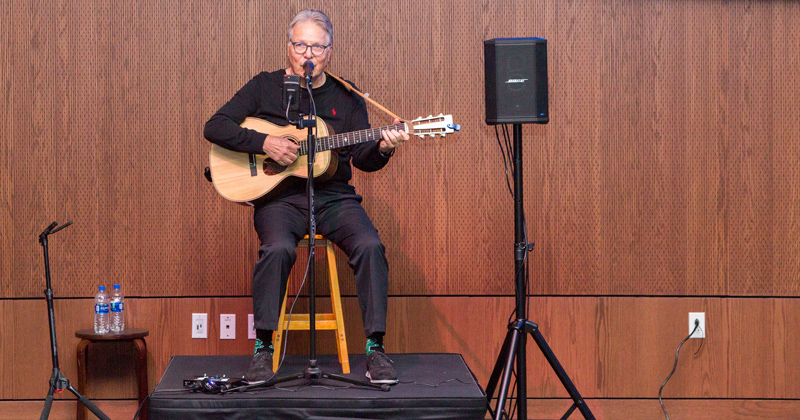


Is your political reality purchased?
Photo by Maria Errico May 19, 2020
UD Prof. Danilo Yanich explores TV ads, money, news and election outcomes
Attendees at the alumni event in October 2019, for graduates of the Joseph R. Biden, Jr. School of Public Policy and Administration at the University of Delaware, mingled and reconnected while a musician played covers of familiar pop rock songs, gypsy jazz and bossa nova. A newcomer to the Biden School might not have guessed, but Danilo Yanich, the entertainer that evening, has vast expertise that goes far beyond the music.

Yanich, a media policy author and scholar, has spent the last several years considering the media’s role in the outcomes of the 2016 election. His new book, Buying Reality: Political Ads, Money, and Local Television News is now available from Fordham Press.
“One of the biggest political stories of 2016 was how Hillary Clinton, the candidate who bought three-quarters of the political ads that ran, lost to Trump, the candidate whose every provocative tweet set the agenda for the daily news coverage,” Yanich said. “We all see more targeted, and microtargeted, digital advertising, which might make it seem like TV ads are inconsequential. But really, campaign spending on TV ads shows that these ads have an outsized influence on voter behavior.”
TV spending has gone up dramatically since 2006 — in 2016 alone, $4.4 billion was spent on TV political ads for both presidential and down-ballot candidates. Prior to the coronavirus (COVID-19) pandemic, spending for the 2020 race overwhelmed previous campaigns by unheard-of amounts. Even with the pandemic, TV spending will still be dominant in 2020, particularly as the retail politics of campaign rallies take a hit.
Down-ballot candidates compete in a media environment where national political news gets the overwhelming attention — by comparison, local and state news is largely absent. There was a stark imbalance in 2016 — almost 90% of local political stories focused on the presidential race, while two-thirds of the money and ads addressed down-ballot campaigns where candidates lack the celebrity of presidential contenders. Without coverage of local issues and races, ad buys on local TV newscasts are the best chance most candidates have to get their messages in front of a broadcast audience that is more fragmented than ever.
“On local TV news, political ads create the reality of local races — a reality that is not meant to inform voters, but to persuade them,” Yanich said. “Voters are left to their own devices to fill in the space between what the ads say — the bought reality — and what political stories used to cover. And, even as the COVID-19 pandemic changes election strategies, the 2020 campaign will be much the same because the perfect storm of factors — insecure majorities, campaign finance laws and a media system that benefits from the arrangement — continue to dominate politics in the U.S.”
More on Danilo Yanich
Danilo Yanich is a professor of Urban Affairs and Public Policy at the Joseph R. Biden, Jr. School of Public Policy and Administration at the University of Delaware. He is an associate director of the school and directs the master’s program in urban affairs and public policy. He is a two-time Presidential Fellow of the Salzburg Seminar; his research focuses on the relationship among the media, citizenship, and public policy.
Contact Us
Have a UDaily story idea?
Contact us at ocm@udel.edu
Members of the press
Contact us at 302-831-NEWS or visit the Media Relations website

